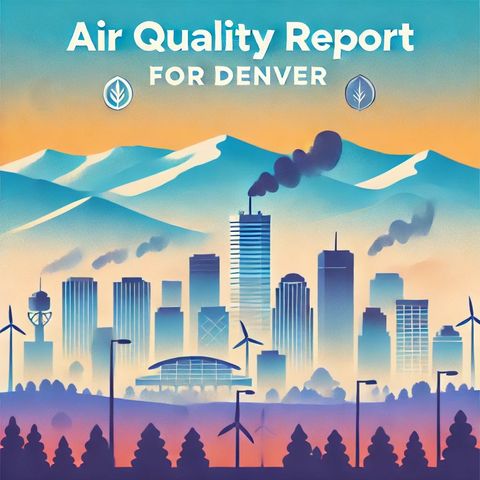Denver's Air Quality Sees Moderate Levels, Prompting Health Concerns

Download and listen anywhere
Download your favorite episodes and enjoy them, wherever you are! Sign up or log in now to access offline listening.
Denver's Air Quality Sees Moderate Levels, Prompting Health Concerns
This is an automatically generated transcript. Please note that complete accuracy is not guaranteed.
Description
Today's air quality in Denver, Colorado is of significant interest to both residents and visitors due to its direct impact on health and well-being. Air Quality Index, commonly referred to...
show moreAs of today, Denver's AQI stands at a moderate level, which falls within the range of 51 to 100 on the AQI scale. This means that air quality is generally acceptable; however, there may be some pollutants that could pose a moderate health concern for a very small number of people who are unusually sensitive to air pollution. These individuals should consider limiting prolonged outdoor exertion.
The primary contributors to today's AQI levels in Denver include particulate matter, specifically PM2.5 and PM10, and ground-level ozone. Particulate matter, or PM, consists of tiny particles or droplets in the air that can be inhaled and cause serious health issues. PM2.5, which stands for particulate matter less than 2.5 micrometers in diameter, is particularly concerning as it can penetrate deep into the lungs and even enter the bloodstream. Sources of PM2.5 include vehicles, industrial processes, and natural sources like wildfires.
Ground-level ozone is another major component impacting today's air quality in Denver. Unlike the protective ozone layer high above the Earth, ground-level ozone is formed when pollutants emitted by cars, power plants, industrial boilers, refineries, and other sources chemically react in the presence of sunlight. This pollutant is known to cause respiratory issues and can aggravate conditions such as asthma and bronchitis.
Weather conditions also play a significant role in influencing daily air quality. In Denver, a city known for its high elevation and unique geographical location near the Rocky Mountains, weather patterns can either help disperse pollutants or cause them to accumulate. Today's weather conditions feature moderate temperatures and relatively low humidity, which generally support better air quality. However, temperature inversions, where a layer of warm air traps pollutants close to the ground, can occur and lead to temporary spikes in pollution levels.
Local authorities continue to monitor the air quality closely and provide updates and recommendations for the public. For those concerned about air quality, it is advisable to stay informed through reliable sources and take appropriate measures to minimize exposure. This might include reducing outdoor activities, especially during the afternoon when ground-level ozone reaches its peak, or using air purifiers indoors to help reduce the concentration of pollutants.
Denver's commitment to improving air quality includes ongoing efforts to reduce emissions from various sources, promote the use of public transportation, and encourage the adoption of cleaner technologies. While today's air quality is moderate, continued vigilance and proactive measures are essential to ensure that all residents and visitors can enjoy cleaner, healthier air in the future.
Information
| Author | QP-5 |
| Organization | William Corbin |
| Website | - |
| Tags |
Copyright 2024 - Spreaker Inc. an iHeartMedia Company
